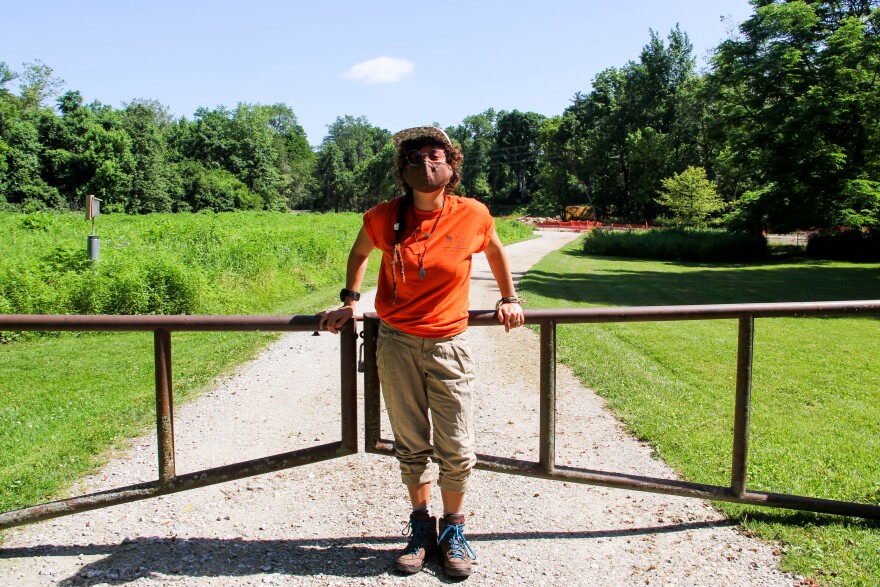Before the coronavirus pandemic, Leticia Classen-Rodriguez planned on spending spring and summer searching for wolf spiders along a winding tree-covered road in Ladue.
Classen-Rodriguez, a doctoral candidate in ecology at St. Louis University, records the environments of wolf spiders. She’s researching how the sounds of construction work and other human activities interfere with their ability to listen for food, mates and threats.
But when universities and research institutions in St. Louis closed laboratories and field sites to reduce exposure to the coronavirus, Classen-Rodriguez and many other scientists had to work from home. Much of their work has been delayed or halted because developing treatments for chronic diseases and studying wild animals can’t be done remotely.
Months of not being able to do research has Classen-Rodriguez questioning her self-worth.
“I can’t do my recordings. I can’t do my field surveys,” she said. “I’ve always been a work-driven person. That’s how I value myself. If I don’t work or don’t feel like I have worked enough, I feel like I’m not doing anything.”
While many people probably don’t want to spend their time looking for palm-sized wolf spiders, the work that Classen-Rodriguez conducts could inform how noisy human activities could be hurting wildlife nearby. But the Litzsinger Road Ecology Center in Ladue has been closed since March.
The Washington University School of Medicine also restricted access to its laboratories March 11, when the university began requiring employees to work from home. Researchers studying what causes arthritis and potential treatments had to stop running experiments, said Farshid Guilak, who directs the lab.
“What went from people worrying about meeting a deadline in two weeks went to, ‘Oh, the lab’s shut down. Nobody has a deadline anymore,’” recalled Guilak, who specializes in orthopaedic surgery.

Between mid-March to the medical school’s reopening in mid-May, only one technician entered Guilak’s laboratory to feed the mice he and his colleagues use for experiments to keep them from losing several years of work. His students and staff kept themselves busy while they were away from the lab, but he was eager to return.
“We were starting to run out of things to analyze and write,” he said.
Researchers may lose funding
While some scientists have returned to work in recent weeks, many are concerned about the consequences of delayed research.
“In the academic world, things run on cycles, so if you miss one cycle, that could mean a year delay on what you’re doing,” Guilak said.
Grant applications also require some data collection to be successful, said Kirk Czymmek, who directs a laboratory at the Donald Danforth Plant Science Center that uses microscopes to analyze crops.
“Because of the stay-at-home order, a lot of the data that I would be normally submitting with an application to make it stronger has not been possible,” Czymmek said.
Scientists are submitting more grant applications while being stuck at home. That could increase the competition for grants and make funding less available, Czymmek said.
'Used to rolling with the punches'
If it weren’t for the pandemic, Missouri Botanical Garden researcher Ashley Glenn would be spending this summer traveling to Croatia, Bosnia and potentially Armenia. The ethnobotanist has been working for three years to understand how Bosnian refugees adapt to St. Louis, where food supplies and culture differ from those of Eastern Europe.

When St. Louis officials implemented stay-at-home orders, Glenn stopped cooking and interviewing Bosnian families. She canceled her fieldwork trips. It’s uncertain when she’ll be able to start meeting with them again, Glenn said.
“We’re trying to plan without knowing what we’re planning for,” Glenn said.
But scientific research is often unpredictable. Botanists often have to travel to remote communities and collaborate with them to study plants. Sometimes they don’t want to work with scientists or something else has happened to halt research, Glenn said.
“From like an elder council that got reelected and doesn’t like your project anymore to a political coup in the country, to a river that was bigger than last year, so you can’t get across it,” Glenn said. “We’re used to rolling with the punches.”
Like other researchers, Glenn has spent her time reading studies she previously didn’t have time to read.
“I’m used to renting an apartment in a country where I know almost no one and spending all of my time alone writing all day, reading all day,” Glenn said. “I’m just treating it like I’m in the field.”
Leticia Classen-Rodriguez, the wolf spider researcher, has often thought during the pandemic about how difficult it was to conduct research at her alma mater, the University of Puerto Rico. In 2017, protests over budget cuts closed the school. She had to move supplies from the laboratory and help stressed students travel to a cramped research station in El Yunque, the island’s rainforest.
Those experiences helped her gain perspective about her limitations and console colleagues during the pandemic, she said.
“Having that in my background, [working remotely] was nothing new to me,” Classen-Rodriguez said. “But the people around me were not dealing with it as well, so I was just trying to be supportive and being like, ‘Take this time to think about yourself and think about what you can do. And if you can’t focus, don’t blame yourself.’”
Follow Eli on Twitter: @StoriesByEli
Our priority is you. Support coverage that’s reliable, trustworthy and more essential than ever. Donate today.
Send questions and comments about this story to feedback@stlpublicradio.org
Copyright 2021 St. Louis Public Radio. To see more, visit St. Louis Public Radio. 9(MDA3OTgyNDI4MDEzMTM0MjQzMTZlNDI0Mg004))


